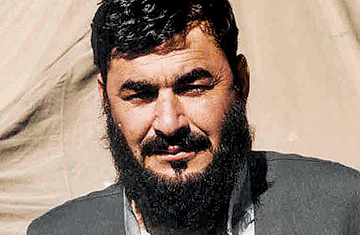
Bashir Noorzai, an Afghan who is on the United States' list of most wanted drug kingpins.
(5 of 8)
Noorzai had seen more than enough. "I thought I would be next," he says. He ceased to aid the Americans and fled to Pakistan, where he stayed for the next two years.
In early 2004, however, Noorzai says, President Karzai's brother phoned to lobby him to talk to the Americans again. "'You are a tribal leader,'" Noorzai said Wali Karzai told him. "'You can help.'" Separately, Noorzai got a call from Saitullah Khan Babar, a friend and former officer in Pakistan's military intelligence service, the ISI. The Americans, Babar told Noorzai, had proposed a meeting in Dubai, neutral turf. Warily, Noorzai agreed.
In early April 2004, he traveled to Dubai to meet with two Americans at a JW Marriott hotel. One identified himself as "Mike," from the Defense Intelligence Agency (DIA), the other "Brian," from the FBI. That day, as they would three more times over the next five months, they spent hours grilling Noorzai, trying to find out what he knew about several subjects, including, as Noorzai puts it, "the powder business." According to transcripts TIME has reviewed, the agents were occasionally frustrated by the talks. They pressed Noorzai on how much drug money went to finance al-Qaeda. "None," Noorzai replied. "But the entire world says the opposite," Mike responded. Noorzai stood his ground: "I do not believe it."
A friend who had accompanied Noorzai to the meetings interjected, "You should tell them whatever you know. They want to know how much you know. Do you understand?" Noorzai replied, "I am telling them as much as I know, but I'm not going to say something baseless." The Americans then asked what he knew about al-Qaeda's high command. The answers were not illuminating. Bin Laden? Noorzai admitted to "seeing" him only once, in Kandahar in the late 1990s. What about 9/11 planner Khalid Sheikh Mohammed? Or Abu Zubaydah, al-Qaeda's chief of military operations? "I'm telling you," Noorzai responded irritably, "I don't know any of the Arabs."
Nor would Noorzai provide any confirmation for his interrogators' obvious suspicions that he was in the drug business. When pressed about how he made his living, Noorzai said he inherited land in Kandahar from his father and grandfather and owns two large outdoor markets that generate up to $100,000 a year and that if sold would net about $2 million. He flatly denied U.S. intelligence claims that he had received $500 million in Taliban funds from Mullah Omar for safekeeping.
Noorzai did, however, provide information on individuals who might be helping to steer money to the Taliban and al-Qaeda. In a transcript, he says he would continue to do so. There is no question that elements of what he says--if true--would be extremely useful to American interests. He talks in some detail about current members of the Afghan government and other prominent Afghans he suspects are involved in the drug trade--even while insisting that he was not.
